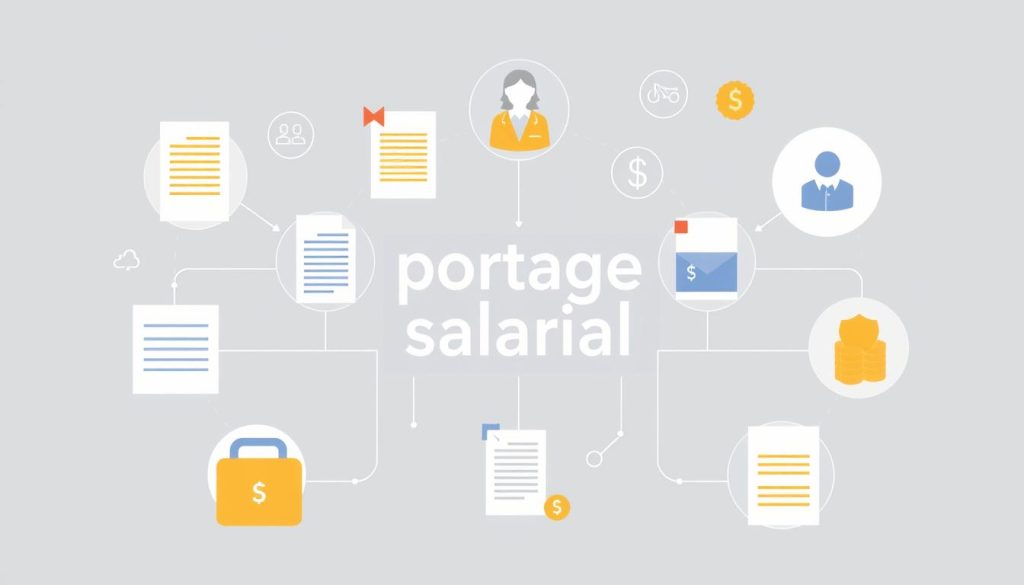The portage salarial sector in France has grown by 40% in the last three years. This is a big change in how people work. It offers a mix of job security and the freedom of freelancing, attracting many professionals.
The gig economy is changing how we see jobs, and portage salarial is a key part of this change. It’s especially popular with workers aged 46 to 65. They find it offers stability and support in their freelance careers.
Portage salarial is more than just a trend. It’s a big change in how we view work and growing our careers. As more people choose this path, it’s clear that portage salarial will play a big role in the future of work.
Table of Contents
Key Takeaways:
- Portage salarial has experienced a 40% growth in France over the last three years.
- This employment model combines the benefits of salaried employment with freelance flexibility.
- Portage salarial is particularly attractive to mature workers, with 46% of users aged 46-65.
- The rise of portage salarial represents a fundamental shift in the approach to work and career development.
- As more professionals embrace this innovative staffing solution, portage salarial is set to shape the future of work.
What is Portage Salarial?
Portage salarial is a new human resources service. It lets freelancers have freedom and job security. This model has a three-way agreement between the freelancer, the client, and the portage company. The portage company takes care of the paperwork and follows labor laws.
Definition and Overview
Portage salarial is a way for freelancers to work on their own but still get job benefits. The portage company is the legal employer. They handle the money and paperwork. But, the freelancer gets to choose their projects and clients.
Key Features
Portage salarial has some key points:
- Minimum annual salary of €30,204
- Management fee of 7-10% by the portage company
- Full employment rights, like vacation and health insurance
- Portage company takes care of taxes
- Good for jobs like graphic design and IT
Benefits for Freelancers
Freelancers get many benefits with portage salarial:
| Benefit | Description |
|---|---|
| Administrative Support | Portage companies manage hours and pay |
| Income Stability | 10% of pay is saved for when you’re not working |
| International Opportunities | Work with clients worldwide and still get benefits |
Using portage salarial, freelancers can focus on their skills. They get job security and benefits. This new way of working is changing how freelancers view their careers.
The Rise of Freelancing in Today’s Economy
The modern workforce is changing fast. More people are choosing freelancing for its flexibility and freedom. This move towards independent contracting is fueled by the gig economy. It offers new chances for both individuals and businesses.
Statistical Trends
Freelancing is growing fast, with some interesting numbers:
- Freelancing has grown by 15% each year, with tech leading at 55%.
- The number of freelancers in the portage salarial sector jumped from 10,000 in 2015 to 200,000 in 2023.
- In 2022, the portage salarial sector made 1.9 billion euros in revenue.
- By 2025, it’s expected to add 500,000 new jobs.
The Gig Economy Impact
The gig economy is changing how businesses work. It lets startups and big companies find talent when they need it. This flexible way of managing workers has many benefits:
| Benefit | Description |
|---|---|
| Cost Savings | 40% of companies are using more freelancers to save money. |
| Flexibility | 70% of freelancers say they’re happier because of the flexibility. |
| Comprehensive Support | Start-ups and freelancers get help with legal stuff, admin, and more. This helps them grow. |
Shifts in Work Preferences
Self-employed professionals are choosing freelancing for many reasons. They want better work-life balance and to pick projects they enjoy. Surveys show:
30% of freelancers say they’re happier because of better work-life balance.
Also, freelancers’ earnings have gone up by 20% in two years. This shows that skilled freelancers can earn well.
How Portage Salarial Works
Portage Salarial is a new way to work in France. It’s popular among freelancers and businesses. It makes working together easy and legal.
This model has three main parts: the freelancer, the client company, and the portage company. Each one is important for a smooth working relationship.

The Financial Structure
Under Portage Salarial, freelancers work for the portage company but for clients. The portage company manages payroll. They handle salaries, social contributions, and payslips.
This makes things easier for freelancers and clients. The portage company takes care of all the paperwork.
Freelancers in France get a minimum salary of €37,394 in 2023. Employers must add 10% to this, making the total salary €41,133. The portage company charges 10% to 15% of the freelancer’s earnings.
Contractual Agreements
Portage Salarial has two contracts. One is between the freelancer and the portage company. The other is between the portage company and the client. These employment contracts can last a fixed or indefinite time.
Employers must give 45 days’ notice for a mutually agreed termination. This lets workers get unemployment benefits. Freelancers get the same protections as regular employees but can work on different projects.
Role of Portage Companies
Portage companies are key to the Portage Salarial model. They handle invoicing, pay salaries, and deal with taxes and social security. They also make sure everything is legal.
Portage companies let freelancers focus on their work. They make it easy for businesses to find talent. This setup simplifies HR and payroll and follows French labor laws.
Advantages of Choosing Portage Salarial
Freelancers often struggle with managing their work and getting social security benefits. Portage salarial helps solve these problems. It offers many benefits that can help freelancers succeed.
Simplified Administrative Tasks
Portage salarial makes admin tasks easier. Freelancers can focus on their work. The company handles invoicing and legal stuff.
This saves freelancers time. They can spend more time on their projects and clients.
Access to Social Security Benefits
Freelancers get full social protection with portage salarial. They get unemployment insurance, retirement plans, and health insurance. This safety net helps freelancers during tough times.
Enhanced Income Stability
Portage salarial also helps with income stability. Freelancers don’t have fixed salaries but get paid holidays. This makes their income more predictable.
Companies working with portage salarial save money. They offer good pay and social protection to their workers.
| Portage Salarial Provider | Average Savings Compared to Temp Agencies | Social Protection Offered |
|---|---|---|
| MITC | 15% | Competitive remuneration, comprehensive social protection |
| AD’Missions | N/A | Bank guarantee for salary payments, assistance with collection procedures, Professional Liability Insurance |
Choosing portage salarial gives freelancers freedom. They can manage their time and clients well. They also get the security and stability this system offers.
Distinct Differences Between Freelancing and Portage Salarial
Both freelancing and portage salarial are forms of self-employment. Yet, they differ in financial management, client relationships, and tax obligations. Knowing these differences is key for those looking to choose the right career path.
Financial Management
Portage salarial has the portage company handle invoicing, collection, and taxes for the carried employee. Freelancers, however, manage these tasks themselves. Here’s a comparison:
| Portage Salarial | Freelancing |
|---|---|
| Portage costs and social contributions: around 45% of turnover | Social charges: 13% to 23% of turnover (depending on status) |
| Regular disclosure of turnover to URSSAF | Detailed accounts, annual filings, and company-related obligations |
Client Relationships
Portage salarial provides a structured way to handle client relationships. The portage company acts as a middleman between the carried employee and the client. Freelancers, however, have full control over their clients, rates, and work organization.
Tax Considerations
Taxes are handled differently in portage salarial and freelancing. In portage salarial, the portage company pays taxes for the carried employee. Freelancers, based on their status (e.g., auto-entrepreneur, EURL, SASU), face different tax obligations:
Freelancers in EURL, SASU, or EURL must contribute to both their salary and dividends, totaling around 45% of their remuneration.
Freelancers also might not have the same access to unemployment benefits and retirement pensions as carried employees. Carried employees get similar benefits to regular employees.
Who Should Consider Portage Salarial?
Portage salarial is a great option for those who want to be their own boss but also want job security. It’s perfect for experienced freelancers, IT contractors, and creative pros looking to grow their careers.
So, who’s a good fit for portage salarial? Professionals with at least three years of experience or a level 5 qualification in France are eligible. Those in non-regulated fields like IT, consulting, and creative industries benefit the most.
Professions That Benefit Most
Many freelance fields see a lot of portage salarial adoption. Here are some of the top ones:
- IT contractors and consultants
- Marketing and communication specialists
- Graphic designers and web developers
- Project managers and business consultants
- Trainers and coaches
Considerations Before Choosing
Before choosing portage salarial, freelancers should think about a few things:
| Factor | Consideration |
|---|---|
| Long-term career goals | Does portage salarial match your career dreams? |
| Financial implications | Know the costs (5-15% commission) and the benefits (at least €2,517.13/month gross salary) |
| Support required | Think about how much help you need with admin, legal, and training |
| Profession eligibility | Make sure your job isn’t restricted (e.g., lawyers, doctors) |
By thinking about these points and looking into companies like Prium Portage, ITG, or Umalis, freelancers can decide if portage salarial is right for them.
Navigating Your Portage Salarial Journey
Starting a freelance career through portage salarial is a unique path to independence. Knowing the key steps helps you transition smoothly and succeed.
Steps to Get Started
To start your portage salarial journey, follow these steps:
- Find a freelance assignment that fits your skills and expertise.
- Look for a reputable portage company that meets your needs.
- Sign a contract with the chosen portage company.
- Start working on your project, aiming for high-quality results for your client.
Finding the Right Portage Company
Choosing the right portage company is key for a good freelance experience. Consider these factors:
- Look at their reputation and experience in the field.
- Check the services they offer, like invoicing and tax management.
- Understand their fees, usually 5% to 7% of what you invoice.
- See if they specialize in your field or industry.
Setting Up Your Business
After picking a portage company, set up your business. This means:
| Step | Description |
|---|---|
| Contractual Agreement | Sign a contract with the portage company, outlining your collaboration and services. |
| Administrative Procedures | Learn about the admin tasks, like submitting timesheets and expense reports. |
| Client Acquisition | Work on getting clients and freelance jobs to keep your work and income steady. |
The portage company acts as your employer, offering benefits and protections while giving you flexibility.
By carefully navigating the portage salarial journey, you can enjoy freelancing’s benefits. You’ll also avoid the hassle of running your own business.
Common Misconceptions About Portage Salarial
Portage salarial is growing fast in France, expected to hit 3.5 billion euros by 2030. Yet, many myths and misconceptions surround it. These can confuse and scare off those thinking about it.
Myths vs. Facts
Many think portage salarial takes away freelancers’ freedom. But, freelancers still pick their clients and projects. They also get support and security from the portage company.
Another myth is that it’s only for short jobs. But, it works for both short and long projects.
| Myth | Fact |
|---|---|
| Portage salarial limits freelancers’ autonomy | Freelancers maintain freedom to choose clients and projects |
| Portage salarial is only for short-term assignments | It can be used for both short-term and long-term projects |
Clarifying the Value Proposition
Portage salarial is a great mix of freelancing and job security. Freelancers get social security, easier admin tasks, and stable income. This lets them focus on their work and grow without freelancing worries.
Addressing Concerns
Some worry about the costs of portage salarial. Companies charge 7-10% for their services and to follow the law. But, think about the support and stability you get.
Tarah L., a successful freelancer, says:
Portage salarial has allowed me to transition into a work-from-home role with the flexibility and support I need to advance my career.
By clearing up these concerns, freelancers can decide if portage salarial fits their career goals.
Comparing Portage Salarial to Other Freelance Options
Professionals have many choices when starting a freelance career. Portage salarial in France is known for its mix of flexibility and security. Let’s see how it stacks up against other freelance options, like traditional freelancing, cooperatives, and flexible employment.
Traditional Freelancing
Traditional freelancing gives you total freedom. You can work on your own terms and choose your projects. But, you must handle all the business tasks yourself. This includes invoicing, taxes, and social security.
Freelancers also face the challenge of unpredictable income. They miss out on benefits that employees get.
Cooperatives and Associations
Cooperatives and associations offer a community for freelancers. They provide shared resources and networking chances. These groups often ask for fees and have rules to join.
They give a sense of belonging but might not offer the same flexibility as portage salarial.

Employment with Flexibility
Flexible employment lets you keep some employee benefits while working part-time or remotely. But, it doesn’t give you the full freedom of freelancing. You also have to follow company rules.
Here are some key points to think about when choosing your freelance options:
| Freelance Option | Key Benefit | Potential Drawback |
|---|---|---|
| Traditional Freelancing | Complete autonomy | Administrative burden |
| Cooperatives and Associations | Community support | Membership requirements |
| Flexible Employment | Some employee benefits | Less autonomy than freelancing |
| Portage Salarial | Balance of flexibility and security | Management fees (5-10%) |
Choosing between portage salarial and other freelance options depends on what you value most. Weighing the pros and cons helps you pick the best fit for your career and personal life.
Personal Testimonials: Experiences with Portage Salarial
Portage salarial is a popular choice for freelancers. It offers a balance between work freedom and financial security. Many freelancers have found success and overcome challenges with this model. Let’s look at some real-life stories and lessons from those who have tried portage salarial.
Success Stories
Sarah, a graphic designer, shares her success: « Portage salarial has changed my career. I focus on design without worrying about paperwork. My company’s support has helped me take on bigger projects and grow my client base. »
Michael, a software developer, talks about financial stability: « Portage salarial gives me a steady income and benefits. I can choose projects that interest me, knowing I’m secure. It’s given me the confidence to follow my dreams. »
Challenges Faced
Freelancers may still face challenges with portage salarial. Laura, a marketing consultant, shares her experience: « It took time to adjust to portage salarial. I had to learn how to work with my company and understand contracts. But with patience and support, I got through it. »
« Balancing projects and clients can be tough, even with portage salarial. Good time management and organization are key to success. »
David, a freelance writer, stresses the importance of clear communication: « When working with portage salarial, it’s important to explain the arrangement to clients. Being open and clear helps build trust and makes collaborations easier. »
Lessons Learned
Freelancers who have tried portage salarial have learned a lot. Here are some key lessons:
- Good communication with the portage company is crucial for a smooth experience.
- Being organized and managing time well is important for handling many projects.
- Keeping skills up to date is necessary to stay competitive.
- Building a strong network and keeping client relationships is key for success.
| Lesson | Importance |
|---|---|
| Effective Communication | Essential for smooth collaboration with portage company |
| Time Management | Crucial for juggling multiple projects and clients |
| Continuous Learning | Necessary to remain competitive in the freelance market |
| Networking | Vital for building client relationships and long-term success |
By learning from others and applying these lessons, freelancers can succeed in portage salarial. Embracing its challenges and opportunities can lead to a fulfilling career.
The Future of Portage Salarial Solutions
The freelance economy is booming, with over 848,000 new businesses in France in 2020. This growth has led to a 33% increase in self-employed individuals since 2008. GoGlobal’s breakthrough in portage salarial is set to change how freelancers work. It promises more flexibility, security, and support in their careers.
Emerging Trends
The portage salarial sector is expected to grow a lot in the next few years. It’s projected to reach €1.9 billion by 2023 and over €500,000 by 2025. This growth will come from new trends like digital platforms connecting freelancers with clients.
New services and support for freelancers will also play a big role. The rise of remote work and the need for specialized skills will shape the future. More people will want flexible work that lets them balance their personal and professional lives.
Adaptations in the Workforce
As the workforce changes, portage salarial solutions must adapt too. They will need to offer more specialized services, like training and professional development. They will also have to provide better support for freelancers in legal and financial matters.
The gig economy and the demand for freelance talent will require new strategies. Portage salarial companies will need to attract and keep top talent. They can do this by offering competitive benefits and opportunities for career growth.
Predictions for the Next Decade
In the next decade, portage salarial will be even more important. The freelance economy is expected to keep growing. More people will want flexible work arrangements, making portage salarial a popular choice.
As new innovations emerge, like digital platforms and expanded services, the sector will see significant growth. Portage salarial is set for a big transformation in the coming years.
FAQ
What is portage salarial?
What are the benefits of portage salarial for freelancers?
How does portage salarial differ from traditional freelancing?
Who is best suited for portage salarial?
How do I get started with portage salarial?
What are some common misconceptions about portage salarial?
What does the future hold for portage salarial solutions?
Source Links
- The Revolution of Portage Salarial Explained
- Freelance Solution: Le portage salarial Benefits
- Freelance Salarial: Guide to Independent Pay Structure
- What is a Portage Salarial in France?
- How a French Portage Salarial Differs from an Employer of Record (EOR) – Atlas HXM
- Portage Salarial International: What Is It and How Does It Work?
- Freelancing Evolution with "La révolution du portage salarial"
- Discover Portage Salarial International Benefits Today
- Archives des Portage Salarial Revolution – Portage-si
- What is Portage Salarial in France | Omnipresent
- Portage Salarial – Boundless
- Portage salarial: advantages, disadvantages and pitfalls to avoid
- Outsourcing: The advantages of wage portage – MITC Consulting
- Portage salarial – Definition, Operation et Advantages | AD’Missions
- Wage Portage VS Freelance: What are the Differences? – Selkea Luxembourg
- WordPress 6.3: Discover what’s new and updated in the latest version
- Portage Salarial in France: What it is & Best Providers
- Guide to Portage Salarial – A Flexible Work Solution in France – Prasanth Ragupathy
- Your Ultimate Guide: learn Everything about Portage Salarial
- Formalités Portage Salarial: Essential Guide
- Le Portage Salarial: Your Path to Professional Freedom
- Explore Top Remote Work Opportunities Online
- Freelance IT Pros & Le Portage Salarial Guide
- Portage Salarial et Retraite: Freelance Retirement
- Portage Salarial: Key to Professional Success
- Portage Salarial: Uncover Hidden Fees & Charges
- Why Seniors Favor Wage Portage Solutions
- Umalis Group: Rising Giant in Portage Salarial
- France Portage Salarial – Leap29
- Focus on freelance administration, the Eldorado for the self-employed





